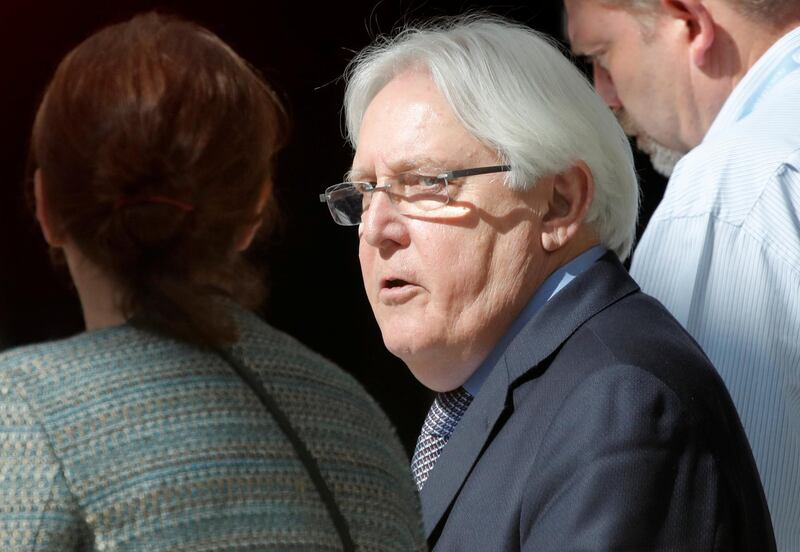The United Nations has asked Sweden to host Yemen peace talks as western powers make a push for a deescalation of the country's civil war.
The last attempt at a negotiated peace in September collapsed after Houthi rebel representatives refused to travel Geneva for meetings with the internationally-recognised government.
Swedish Foreign Minister Margot Wallstrom said the UN asked if Sweden "could be a place for the UN envoy to gather the parties in this conflict".
Ms Wallstrom told Sweden's news agency TT that Copenhagen would be "happy about it" but that nothing was definite.
"We have always supported UN envoy Martin Griffiths, both in the United Nations and in the EU," she said.
_______________
Read more:
US calls for Yemen peace efforts as Hodeidah prepares for new offensive
[ Terrorist and insurgents inserted on Yemen payrolls, Britain warns ]
UN Envoy to Yemen holds talks in Washington seeking to jump-start political process
_______________
In response, Mr Griffiths welcomed international calls for the resumption of peace talks on Wednesday.
“I urge all concerned parties to seize this opportunity to engage constructively with our current efforts to swiftly resume political consultations to agree on a framework for political negotiations, and confidence-building measures, in particular enhancing the capacities of the Central Bank of Yemen, the exchange of prisoners and the re opening of Sanaa airport," he said in a statement.
"We remain committed to bring the Yemeni parties to the negotiations table within a month. Dialogue remains the only path to reach an inclusive agreement.”
During the last six months, the United Nations has pushed for a political deal to end the conflict. Mr Griffiths hinted that a “major deal” is expected be reached by the end of the year.
In the strongest line yet from the US, Pentagon chief James Mattis said on Tuesday that talks must happen within the next 30 days.
"We have got to move toward a peace effort here, and we can't say we are going to do it sometime in the future," Mr Mattis said at the US Institute of Peace in Washington.
Warring parties must “meet in Sweden in November and come to a solution, not talk about subordinate issues,” he said.
British Prime Minister Theresa May backed Mr Mattis's call for action.
"We certainly back the US's call for de-escalation in Yemen," Ms May told parliament on Wednesday. "A nationwide ceasefire will only have an effect on the ground if it is underpinned by a political deal between the conflict parties."
The British Foreign Office Minister for the Middle East, Alistair Burt, suggested Houthis were to blame for the failure of the Geneva initiative, adding that maximum support for the efforts of Mr Griffiths was needed.
"The best way to use the United Nations Security Council is to support the role of UN special envoy Martin Griffiths," he said. "We don't want to do anything to undercut it. If you want to see an end to the conflict you will support Martin Griffiths and his efforts."
Mr Burt said that Houthis are responsible for the abuse of humanitarian aid, systematic recruitment of child soldiers, interference with health campaigns to battle cholera outbreaks and campaigns of targeted assassination.
Both the US and UK should pressure the Houthis to seriously participate in peace talks, Saeed Alwahabi, a Saudi commentator, said.
"Any plans for a ceasefire is generally welcomed by the coalition as it has happened twice before," Mr Alwahabi said.
The US and UK are calling for a ceasefire now because they believe Saudi Arabia is in a position to show good will, said Cinzia Bianco, a senior analyst at Gulf State Analytics.
While peace talks will likely face the same hurdles that blocked previous efforts, a ceasefire might be more achievable, she suggested. "The longer-term hope is that a freeze of the conflict would allow for better conditions to negotiate politically," Ms Bianco said.
UN peace talks in Geneva ended in September before they ever properly started after Mr Griffiths postponed the meeting and admitted that it had not been possible to persuade the Houthi rebels to come to the Swiss city.
Mr Griffiths stressed that the failure to hold the talks was not a fundamental blockage to the peace process and did not signify a deadlock. He said it merely delayed the formal start and, nevertheless, progress had been made.
Yemeni Foreign Minister Khalid Al Yamani told The National in September that he hopes for more substantive discussions soon.
The minister, who leads the government delegation, said that the international community should have been more serious in dealing with the Houthis.
Mr Al Yamani said that if the rebels were sincere about reaching a peace deal then they should have come, even if the two factions were meeting in separate rooms with Mr Griffiths’ acting as an intermediary.
Meanwhile in Aden, the UAE's Minister of State for International Cooperation, Reem Al Hashemy, visited the UAE's Armed Forces.
Ms Al Hashemy commended the soldiers for their courage and determination, reported state news agency Wam.
Her visit comes a few days after the Saudi-led Arab coalition deployed 10,000 additional troops to the rebel-held port of Hodeidah.
Military operations have been renewed this week in the vital port city aiming to push back the rebels, but they still hold parts of Hodeidah and the capital Sanaa.
Saudi Arabia and its allies intervened in the conflict between embattled Yemeni President Abedrabbo Mansour Hadi, whose government is recognised by the United Nations, and the Houthis in 2015.





